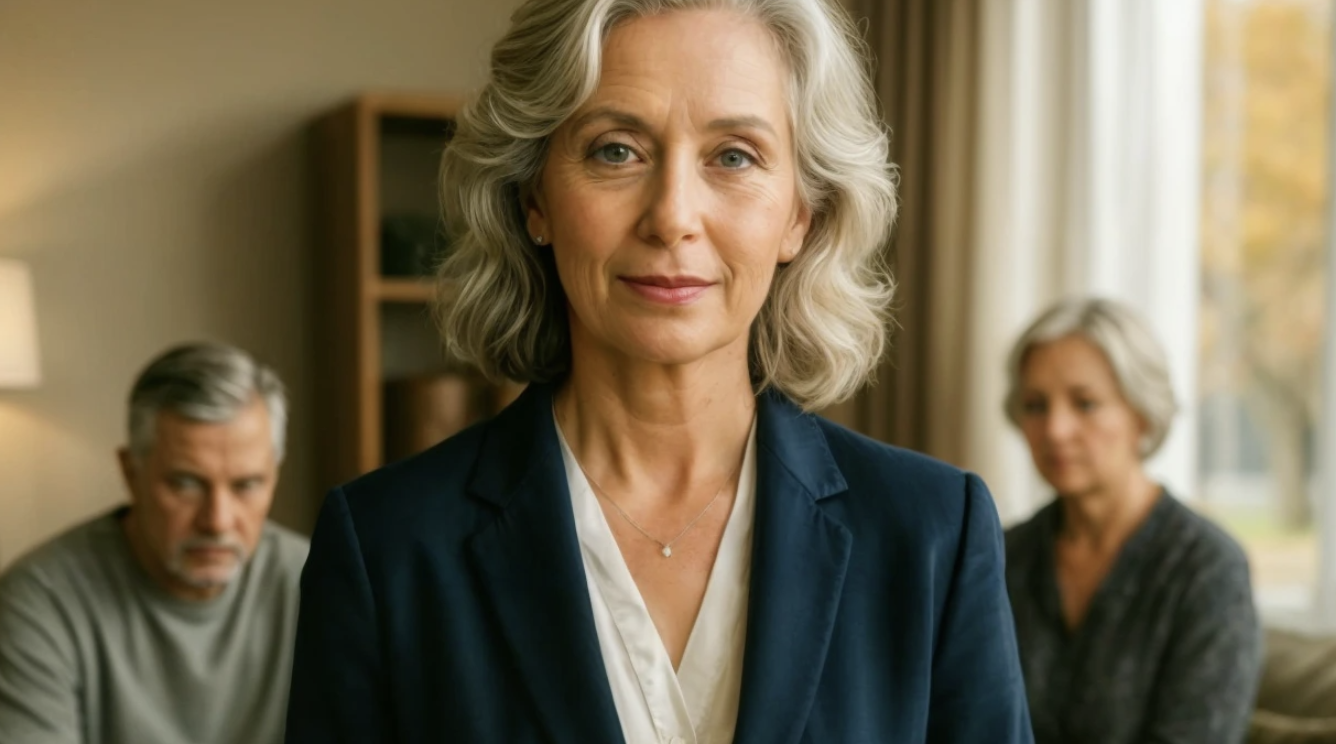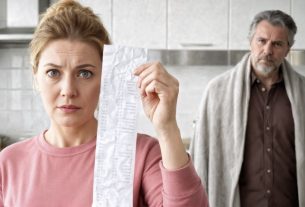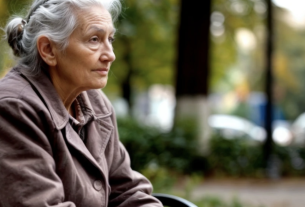Elena Sergeyevna scrubbed at a stain on the kitchen oilcloth for a long time. The stain was old, ground in—an orange ring left by a hot mug of tea her husband had set down three years ago, back when he was considered a healthy man.
Now that stain had become her point of support. When it got completely unbearable—when her back turned wooden from endless bending, and her temples began to throb—she would simply take a stiff sponge and scrub that circle.
It seemed to her that if she could scrub away that grime, then everything else in her life would somehow clean itself too.
From the bedroom, cutting through the noise of the kettle coming to a boil, drifted the familiar, drawn-out voice with the whiny notes of a spoiled child:
“Leeeen… Where are you? Fix my pillow. It’s all lumpy—clumped up, it’s impossible.”
Elena exhaled. Not loudly, so he wouldn’t hear, but as if she’d released the last air from her lungs, leaving a vacuum inside. She wiped her wet, water-reddened hands on her apron—old, terry cloth, with faded cherries, the one she’d worn for ten years—and went.
The hallway smelled of dust and old outerwear. The bedroom smelled different—thick, heavy.
It reeked of medicines, warming ointment with viper venom, an unwashed body, and that special sour staleness that exists only in rooms where the windows get sealed with painter’s tape back in mid-October, afraid of the slightest draft.
Anatoly lay on his back, staring at the ceiling where a yellow stain from an old leak spread like a bruise. His face looked suffering and slack; his cheeks had sprawled across the pillowcase like dough forgotten on a table.
“What now?” she asked quietly, leaning her shoulder against the doorframe.
The bedroom door always stuck a little—the house was settling, the geometry drifting. To close it tightly you had to lift the handle upward with effort. But right now the door stood wide open.
It had been wide open for the past six months, so Elena could hear every groan, every sigh, every request.
“My back is killing me,” he rasped without even turning his head toward her. “And give me something to drink. Just not from the carafe—it’s icy. Dilute it with boiling water. Cold makes my side stab, I can’t take it.”
Elena went to the bed. With the practiced, automatic motion of someone who’s done it too many times, she slid her hand under his neck—heavy, sweaty—jerked him up, and fluffed the pillow with her other hand. He was bulky.
In six months of his mysterious “illness,” he hadn’t grown thin the way bedridden people usually do. If anything, he’d spread out, gone soft and swollen, as if he’d melted into the couch and filled all the space around him.
At the clinic the doctors only spread their hands and avoided her eyes: “Your husband’s tests are perfect—ready for space flight. Hemoglobin, sugar, ECG—everything normal. But age, you know… Psychosomatics. Neurology is a dark business. If a patient says his legs won’t hold him, it means the signal isn’t getting through. Take care of him. He needs rest.”
“A caregiver is coming tomorrow,” Elena said, handing him a cup of warm water. It was his favorite cup—chipped handle, the words Head of the Family on the side. He didn’t recognize any other dishware. “Galina Petrovna. A serious woman with a medical background, good references.”
Tolya choked on the water. It spilled down his chin and onto the collar of his washed-out T-shirt. He coughed theatrically, with strain, turning into a thin wheeze.
“A strange woman… in our house?” he said once he caught his breath. He wiped his mouth with the back of his hand and looked at his wife like a beaten dog. “Do we have money to burn? Or is it hard for you to give your own husband a glass of water? You’re abandoning me?”
“I’m not abandoning you, Tolya. I have to go back to work. My boss called—either I come in or I write a resignation letter. And I still need two more years of service for my pension. Otherwise we’ll both be living on your minimum. And medicine is expensive now.”
“Expensive…” he mocked, turning to face the wall. “Saving money on your husband.”
Elena said nothing. She didn’t tell him that the money for Galina Petrovna wasn’t her salary, which barely covered food and utilities.
It was her “dental stash.”
Money she’d been setting aside for three years—for two bridges and three metal-ceramic crowns. Now her teeth would have to wait. Maybe forever. The main thing was to keep her job, keep the feeling that she was still needed by someone besides that stifling couch.
At work, in the housing office accounting department, it smelled of dry paper, cheap instant coffee, and ozone from the old photocopier. To Elena that smell was sweeter than any French perfume. It smelled like freedom.
She sat at her desk, buried under payroll sheets, and felt her back unbend. Here no one groaned, no one asked her to fix a blanket, no one demanded puréed food.
“Len, why are you staring off into space?” Svetochka called to her—the young HR clerk, forever chewing mint gum. “Something happen? Or Anatoly Borisovich again…?”
Elena flinched and automatically adjusted the button on her blouse. The button hung by a single thread—she’d never gotten around to sewing it on properly—and that tiny risk—will it come off now or later?—strangely distracted her from the anxiety.
“Everything’s fine, Sveta. I hired a caregiver. I’m just worried. A stranger in the apartment.”
“Oh, good for you!” Svetochka waved a hand with long, acid-green nails. “You’ve run yourself into the ground. You’ve gone gray—only your eyes left. And men, they’re like that… They love it when everyone dances around them. Mine—when his temperature hits thirty-seven-point-two, he sits down to write his will.”
Elena smiled faintly. The comparison wasn’t fair. Her Tolya had been lying there for half a year. But she didn’t feel like explaining.
She hadn’t bought the camera because she suspected her husband. She was simply afraid to leave Galina Petrovna alone with him.
You never know. What if she starts carrying off food? Sugar is expensive now, buckwheat too—and the jar of coffee has been shrinking suspiciously fast.
Or God forbid she hurts him, bedridden as he is. He’s helpless like a baby. Nasty, sarcastic—but her own. Thirty-five years together. You can’t just cross that out.
She hid the small black cube with its little lens-eye on the bookshelf, behind a 1964 Encyclopedia of Home Economics. The spine was torn just right, and the camera fit perfectly into the rip, blending into the dark binding.
The day passed in a fog. Numbers in the reports jumped; lines slid apart. Elena kept glancing at her phone, expecting a call from the caregiver. But the phone stayed silent.
She almost ran home. Didn’t stop at the store, ignored the line for fresh bread. In her bag was a carton of kefir and two hundred grams of bologna—something to spoil him, the sufferer.
The apartment was unexpectedly quiet. Galina Petrovna sat in the kitchen, drinking tea from her own mug (brought it with her—too squeamish to use the homeowner’s) and solving a crossword.
“Yours is asleep,” she said without lifting her eyes from the magazine. “He ate, grumbled that the soup was under-salted, and fell asleep. A difficult man. Demanding.”
Elena smiled guiltily as she took off her coat.
“He’s sick. He’s worn out—and he’s worn us out too.”
“Mm-hm, mm-hm,” the caregiver drawled vaguely, and in that “mm-hm” Elena heard something odd. Either mockery, or pity.
When Galina left, Elena didn’t go straight to the bedroom. She sank onto a stool by the kitchen table, feeling her legs hum with fatigue. She took out her laptop—old, heavy, its fan roaring like a transformer box—and inserted the memory card.
She only needed to make sure everything was fine. That he’d been fed. That he’d been turned.
Their bedroom appeared on the screen—gray, grainy, lit by a gloomy day.
Here Galina Petrovna enters the frame, fixes the blanket. Her movements are sharp, professional. Here she gives him medicine from a spoon. Tolya grimaces, snaps something at her, waves her off. Galina answers calmly, without malice, and leaves.
Elena was already about to stop the recording, reassured. Her heart began to beat more evenly. Everything was fine. The caregiver was managing.
But then the video jerked.
In the frame, in the silence of the empty room, the blanket suddenly moved. Anatoly—her poor, helpless Tolya, who for six months had moaned in pain at the mere attempt to turn his head—suddenly threw the blanket off.
Sharply. With a tug.
Elena leaned closer to the monitor, squinting. Had she imagined it? Some glitch?
Anatoly swung his legs off the couch. Not sliding down in agony, bracing on his elbows—he hopped off. Scratched his lower back. Stood up to his full height.
He walked around the room. His gait was confident, springy—proprietary, like a хозяин in his own domain. He did a couple of side bends, loosening his waist. Squatted deep—knees fully bent—and rose easily.
Elena watched, and it felt like she was losing her mind. That couldn’t be her husband. That was some double.
Anatoly went to the dresser where Elena, deep in the underwear drawer, hid cigarettes from him (the doctors had strictly forbidden them!). With a sure motion he pulled the drawer out, rummaged, found a pack. He shook one out, inhaled greedily—but didn’t light it, apparently afraid of the smell. He tucked the cigarette behind his ear.
Then he pulled a phone from under the mattress. His own old button phone—the one he’d claimed was “completely dead and won’t hold a charge.”
He dialed quickly. From memory.
The audio was muffled, like it came from inside a barrel, but Elena cranked the volume to maximum.
“Hello, kitty?” her husband’s voice sounded brisk, oily—exactly that disgusting, syrupy tone Elena hadn’t heard in twenty years, probably not since he’d courted her. “Yeah, everything’s fine. My Cerberus ran off to work. Finally. She even hired a caregiver—can you believe it? What a dumb old woman, huh?”
Elena felt something in her chest—not a jolt, not a snap, but a sudden emptiness. As if someone had scooped out all warmth with a spoon, leaving only an icy crust. She sat and stared at the face she knew down to every wrinkle—now it looked like a mask.
“Yeah, I’m lying here, resting,” Tolya went on, strolling around the room like a king. “Why wouldn’t I? They feed me, water me, empty the pots. Yesterday I groaned so hard at her she almost called an ambulance—went white as a sheet.”
“An actor, right? Stanislavsky would be nervously smoking! By the way, when are you bringing me those cabbage pies? She keeps stuffing me with bland porridge and watery soups—can’t stand it anymore. Soon I’ll actually kick the bucket on this diet.”
He laughed—an ugly, croaking, self-satisfied laugh.
“Alright, bye. Kisses everywhere. Don’t call in the evening—she’ll show up and start fussing about her blood pressure and forcing kefir on me again. Love you, yeah. Wait for me. I’m getting out soon.”
He tossed the phone under the pillow, stretched so his joints cracked, and slipped back under the blanket, instantly adopting his usual dying-swan pose. His face turned mournful again. A minute later Galina Petrovna came in with a plate, and Tolya immediately grimaced and let out a weak, pitiful moan.
Elena slowly closed the laptop.
In the kitchen the refrigerator hummed—an old, dependable Saratov. Behind the wall the neighbors’ TV was on; a news anchor droned. Somewhere outside a car alarm wailed. Life went on as usual.
She sat motionless for ten minutes, smoothing the tablecloth with her palm. On the corner was a fringe their cat had once clawed. Elena untangled the threads with her fingers, straightening them. One by one. Calmly. Methodically. A red strand, a white strand.
Then she stood up. Her legs didn’t shake. Her back straightened on its own.
She went into the hallway and pulled out the step ladder. Climbed to the mezzanine. There, in dusty darkness, lay a big checkered suitcase.
They’d bought it for a trip to a sanatorium in Anapa back in 1998. It was bulky, Chinese, on wheels—one of them jammed and squealed nastily.
Elena hauled the suitcase down. Wiped the dust off with a rag.
She went into the bedroom and snapped on the overhead light—the bright chandelier Tolya forbade her to use (“It hurts my eyes”).
Anatoly squinted, opened one eye.
“Lenka, you? Are you crazy? Turn the light off! And bring kefir—my stomach’s growling, I can’t stand it…”
Elena silently went to the wardrobe and flung the doors open.
“What are you doing?” wariness slid into his voice.
She started throwing his things onto the floor. Sweaters, shirts, sweatpants with stretched knees, socks. The clothes flew into a heap, any which way.
“Len? What’s wrong with you? Delirium tremens?”
Elena turned to him. Her face was so calm, so lifelessly smooth, that Anatoly felt real fear for the first time.
“Get up,” she said softly.
“Get up where? Are you out of your mind? I can’t—my back! My legs!”
“Get up, actor,” she said, took the laptop from the table and tossed it onto the bed—right at his feet.
He looked at the screen. The video was paused on the exact moment he stood in the middle of the room in his family briefs, smirking as he scratched his side.
The silence in the room became thick, tangible—like cotton.
Anatoly flushed purple. His neck bulged. Then he suddenly went pale.
“Len, it’s not what you think… It’s remission! I just felt better for a minute, I wanted to surprise you… I just wanted to stretch…”
“Out,” Elena said.
“Where am I supposed to go?” he screeched. “It’s night! My blood pressure! I’m a sick man!”
“To your ‘kitty.’ Or to Stanislavsky at the theater. I don’t care.”
He tried to lie back down again, pull the blanket up to his chin, hide in his usual little house of illness.
Elena came over and yanked the blanket off. With one sharp pull. It flew to the floor.
“Get up, I said. Or I’m calling the police. And an ambulance. Let them document your miraculous healing. And I’ll call the neighbors in and show them the movie.”
“I’m registered here!” he screamed, forgetting his “sick voice” as he sprang upright on the bed. “You have no right! This is my home!”
“The apartment is my mother’s,” Elena said crisply. “I inherited it before the marriage. You’re nobody here. A guest. One who’s overstayed. Pack your junk while I’m still being kind.”
Anatoly stood up. His legs held him perfectly. He understood the game was over. Fuming and frantic, ripping hangers down, he began cramming clothes into the suitcase. He muttered curses, called her “crazy,” “witch,” “old hag.” He promised she’d crawl back to him on her knees, that she’d die alone.
Elena stood by the window with her arms crossed and looked out at the street. There, in the circle of light under a lamp, wind rocked the bare poplar branches. She didn’t care. His words ricocheted off her without touching her.
“Put on your winter boots,” she said suddenly in an even voice, without turning. “It’s freezing out. Ice.”
“Go to hell with your concern!” he snarled, but he pulled the boots from the shoe rack and put them on.
When he dragged the suitcase into the entryway, the broken wheel squealed, sharp and ugly. He kicked at the front door, trying to force the lock. The door wouldn’t budge.
“Lift the handle up,” Elena prompted automatically. “You have to raise it a little.”
He yanked the handle upward, and the door swung open into the dark stairwell.
“Idiot!” he shouted one last time and left, thundering the suitcase down the steps.
Elena walked over and shut the door.
The lock clicked. One turn. A second.
She leaned her back against the cold metal of the door and closed her eyes.
The apartment fell silent. But it wasn’t the frightening, sticky silence of loneliness she’d feared all these years.
It was the silence of cleanliness. The silence of peace.
She went into the kitchen. Took the bologna she’d bought for him from the fridge. Cut a thick, uneven slice. Set it on a piece of black bread.
She turned on the kettle.
Then she went to the window and flung the vent pane wide open.
Cold, prickling air rushed into the overheated kitchen that smelled of medicines—air that smelled of snow, exhaust fumes, and freedom. It pushed out the smell of corvalol, old dust, and lies.
Elena Sergeyevna bit into her sandwich, staring into the darkness of the yard. Somewhere down there, a figure with a suitcase was disappearing, but she didn’t even look down.
Tomorrow she would need to call the housing office, get the carpenter—Mikhalych—to come fix the door handle so it would close easily. And the parquet in the entryway needed gluing down; it squeaked like mad.
Now she could.
There was money.
And she would finally get her teeth fixed after all



